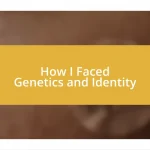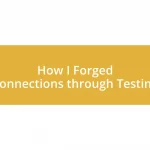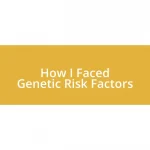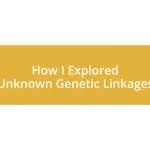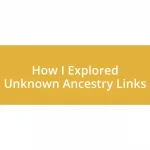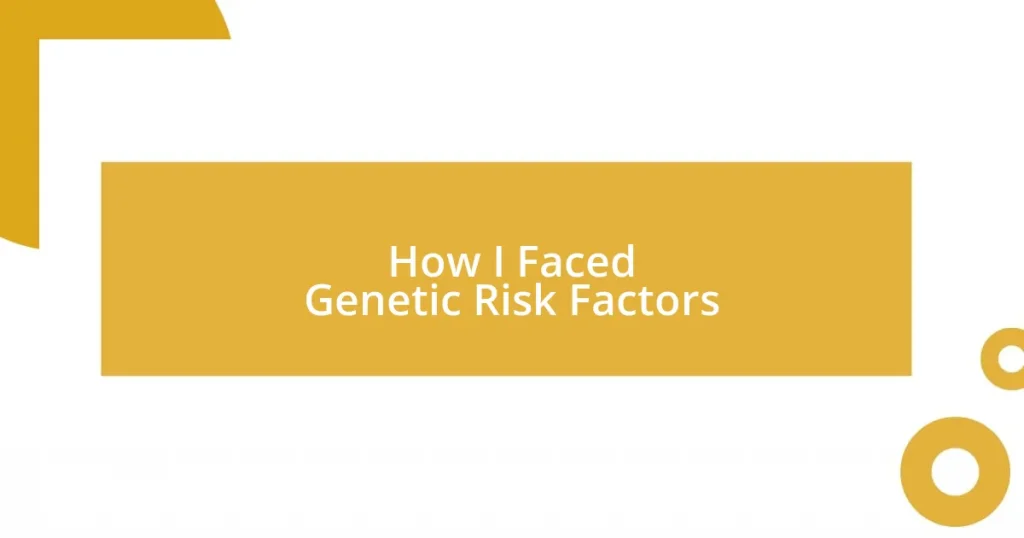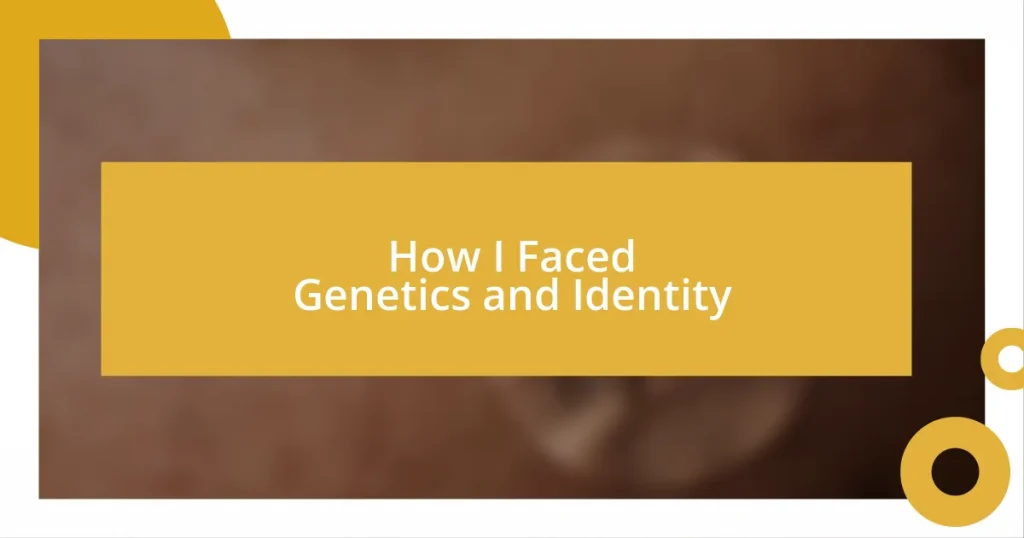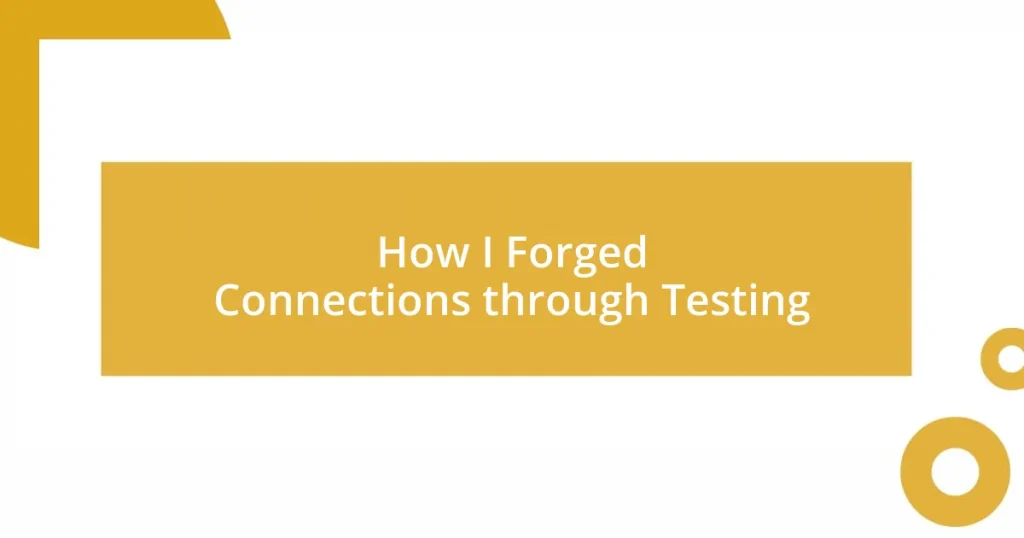Key takeaways:
- Understanding genetic risks empowers individuals to take control of their health rather than feel powerless.
- Consulting with genetic counselors provides tailored guidance and actionable steps based on personal genetic insights.
- Incorporating lifestyle changes, such as healthier eating and exercise, is crucial for managing genetic predispositions.
- Regular monitoring of health and genetic factors helps individuals stay accountable and make informed decisions regarding their well-being.
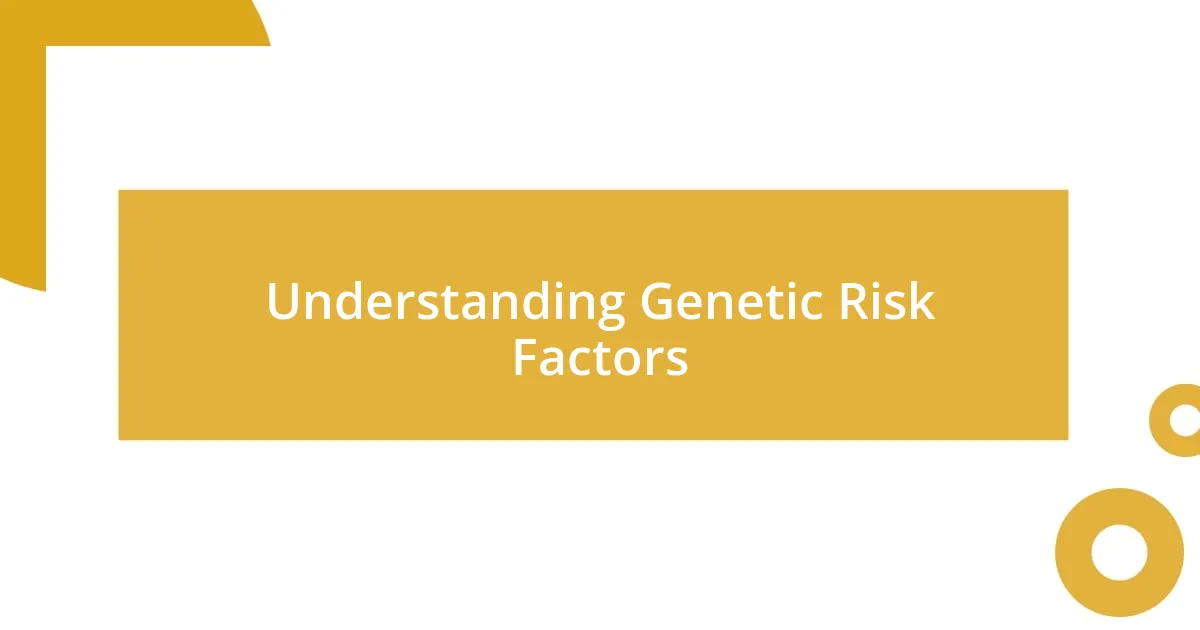
Understanding Genetic Risk Factors
Genetic risk factors are like clues hidden within our DNA that can increase our chances of developing certain conditions. I remember when I first learned about my own genetic predispositions—suddenly, I felt a mix of anxiety and empowerment. It made me wonder, how much of our health is truly in our hands versus written in our genes?
Understanding these factors isn’t just about statistics; it’s about the stories they tell. I recall discussing my family history with my grandmother, whose own battles with heart disease painted a vivid picture of my own risks. This made me think, does knowing our genetic risks change the way we live our lives or the choices we make daily?
Some might feel powerless in the face of their genetic landscape, but I found strength in knowledge. It led me to ask, what proactive steps can I take to mitigate these risks? By staying informed and engaged with my health, I realized I could shift the narrative from fear to proactive management, gathering the tools to navigate my unique genetic journey.
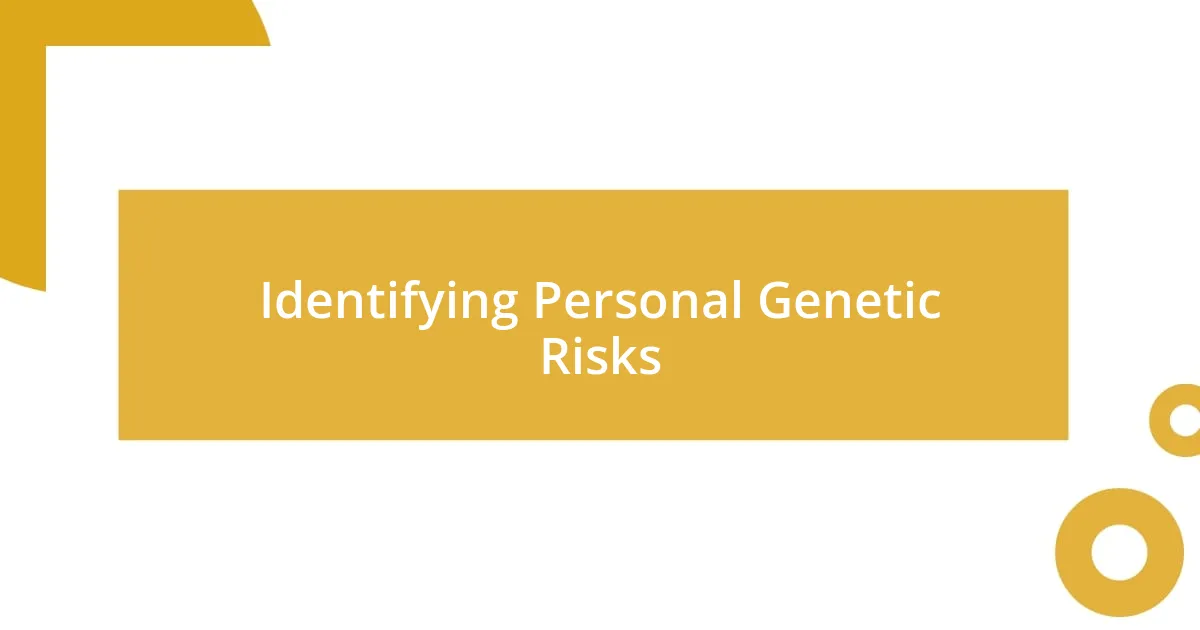
Identifying Personal Genetic Risks
Identifying personal genetic risks can feel overwhelming at first, but it ultimately becomes a powerful tool for taking control of your health. I remember sitting down with a healthcare professional who specialized in genetics. As we thumbed through my genetic report, I felt a wave of emotions—curiosity mixed with apprehension. Knowing these risks didn’t mean surrender; it was more about understanding the landscape of my health.
To further pinpoint genetic risks, consider these key steps:
- Family History: Talk to relatives about their health conditions. Family stories can reveal patterns that might be significant.
- Genetic Testing: Services like 23andMe or MyHeritage can provide insights into your genetic makeup.
- Medical Consultation: Consult with a genetic counselor who can interpret tests and provide personalized recommendations.
- Lifestyle Assessment: Reflect on how your lifestyle choices align with your genetic predispositions.
Taking these steps can turn what feels like a daunting task into an enlightening journey. It’s about gathering pieces of a puzzle that, once assembled, offer a clearer picture of my health landscape.
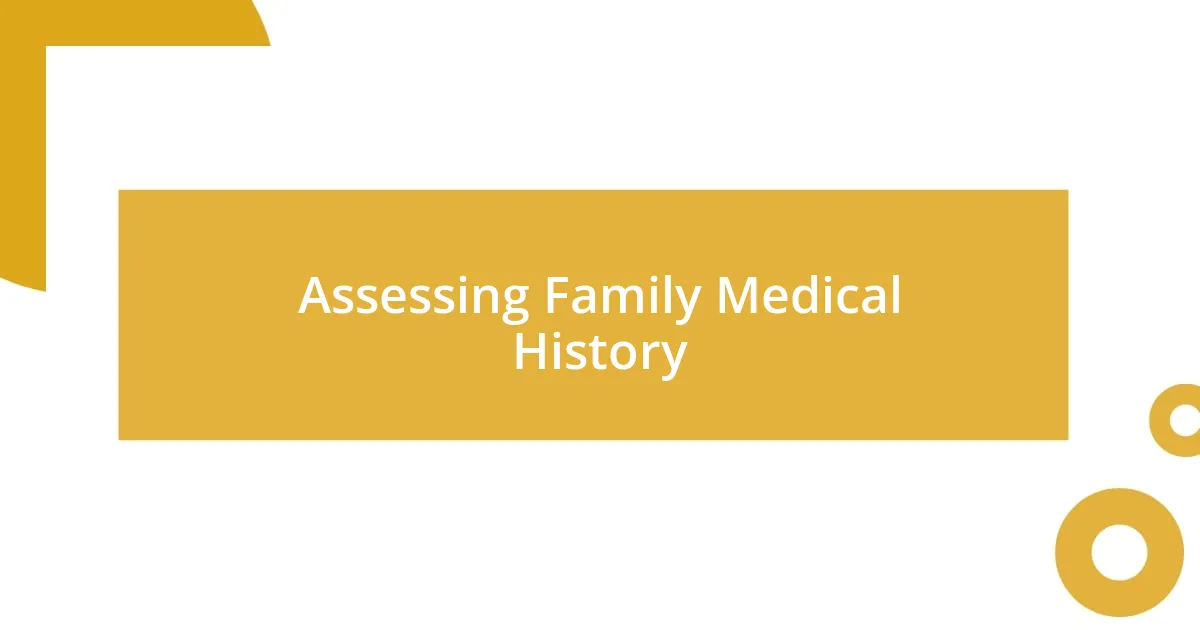
Assessing Family Medical History
Assessing family medical history is a crucial step I took in understanding my genetic risks. I vividly remember sitting around the dinner table, feeling a twinge of nervousness as I asked my parents about any health issues relatives had faced. This conversation unlocked a treasure trove of information—like discovering that certain cancers ran in the family. It made me realize that understanding these patterns is like having a map guiding my health journey.
As I pieced together our family’s medical history, I discovered the importance of looking beyond just immediate relatives. I found out that issues like diabetes and heart disease affected aunts, uncles, and even cousins. This broader perspective highlighted how conditions might skip a generation or manifest differently. It reminded me of how interconnected our health can be, prompting me to keep a detailed record of these findings for future reference.
This ongoing assessment allows me to identify lifestyle changes that can counteract potential risks. For instance, knowing heart disease was prevalent pushed me to adopt healthier eating habits and exercise regularly. It’s like gaining a personalized playbook for my health—one that encourages me to not just rely on possible genetic predispositions but to actively shape my future. Seeing it all laid out made the abstract concept of genetics feel tangible, emphasizing that knowledge can indeed be empowering.
| Key Aspects | Importance |
|---|---|
| Family Conversations | Provides insights into genetic risks. |
| Broader Relatives | Reveals hidden patterns and connections. |
| Health Records | Serves as a reference for proactive health management. |
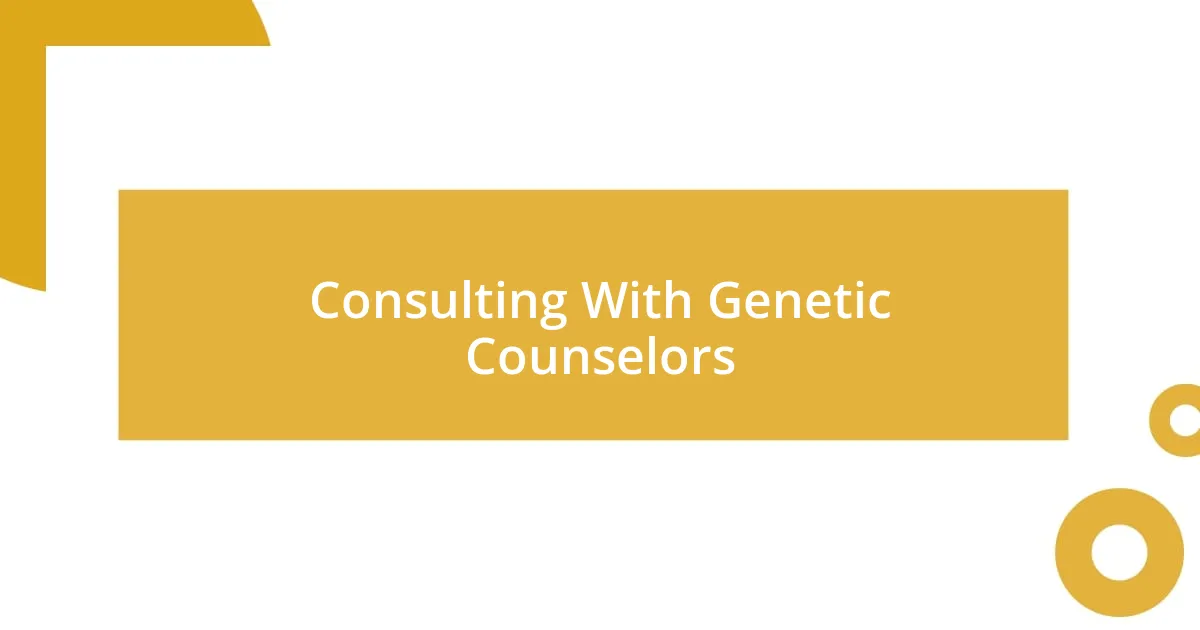
Consulting With Genetic Counselors
When I first consulted a genetic counselor, I didn’t quite know what to expect. Sitting across from them, I felt like I was about to navigate uncharted territory in my health journey. They asked me probing questions that encouraged me to think deeply about my family history and lifestyle choices, which was enlightening. I remember feeling a mix of relief and anxiety; it was comforting to have an expert guide me through this complex information.
The most valuable aspect of this experience was the tailored advice I received. The counselor not only interpreted my genetic tests but also helped me understand what those results meant in a real-world context. I recall their phrase, “Knowledge is power,” which resonated with me. It wasn’t merely about the risks identified; it was about actionable steps I could take to mitigate them. For instance, they recommended specific screenings and lifestyle changes that aligned perfectly with my personal situation, creating a proactive plan that felt empowering.
Over time, I found that talking to my genetic counselor became a platform for open dialogue about my fears and hopes concerning my health. I often left those sessions feeling rejuvenated, equipped with the knowledge to face uncertainties head-on. Have you ever left a conversation feeling like a weight has been lifted? That’s how I felt after each meeting, transforming daunting genetic data into a manageable strategy for my well-being.
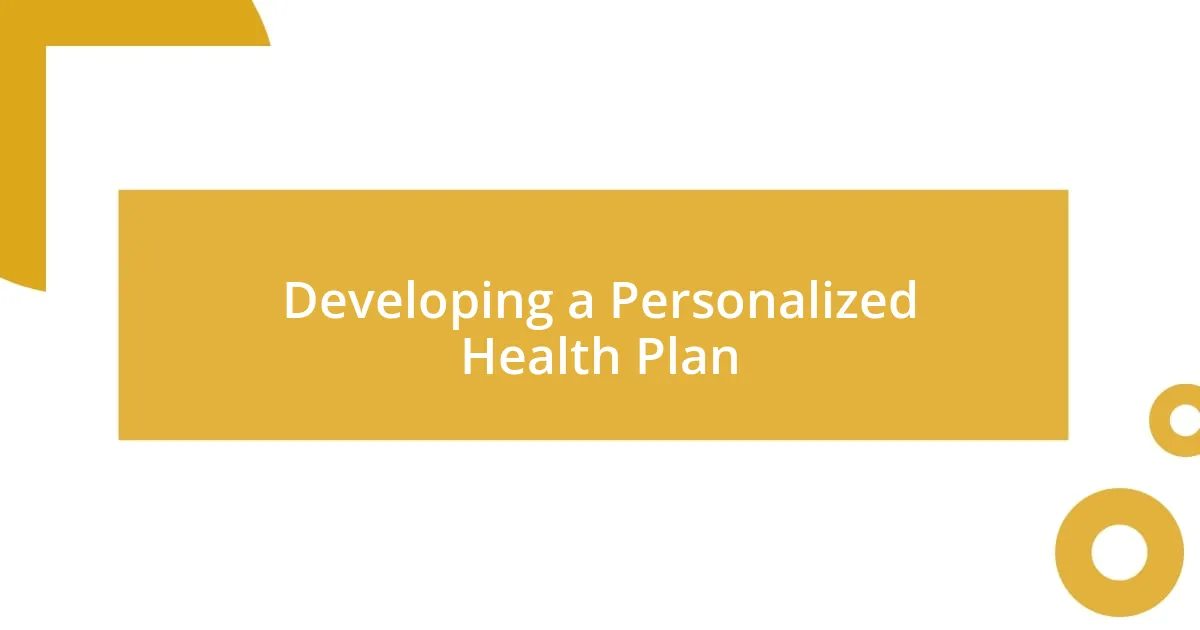
Developing a Personalized Health Plan
After gaining insights from my family medical history and consulting with a genetic counselor, the next logical step was to develop a personalized health plan. I remember sitting down with a notebook, jotting down not just my genetic risks but also lifestyle habits that needed adjustment. It felt like starting a new chapter, where I wasn’t just a bystander in my health journey but an active participant.
Crafting this plan involved more than just a list of dos and don’ts. I took a multifaceted approach, combining dietary changes with fitness goals. For example, knowing I had a family history of heart disease prompted me to embrace not just cardio exercises, but also mindfulness practices, like yoga and meditation. It was like piecing together a puzzle where each element matters. Have you ever felt the satisfaction of creating something uniquely your own? That was me, taking control of my health.
Regularly revisiting my health plan became crucial. It wasn’t static; it evolved based on my experiences, progress, and even setbacks. I learned to celebrate small victories, like lowering my cholesterol numbers after months of dedication. This process taught me that health is an ongoing dialogue—not just with the experts but also with myself. Do you keep track of your progress? I found it invaluable for maintaining motivation and staying true to my personalized path.
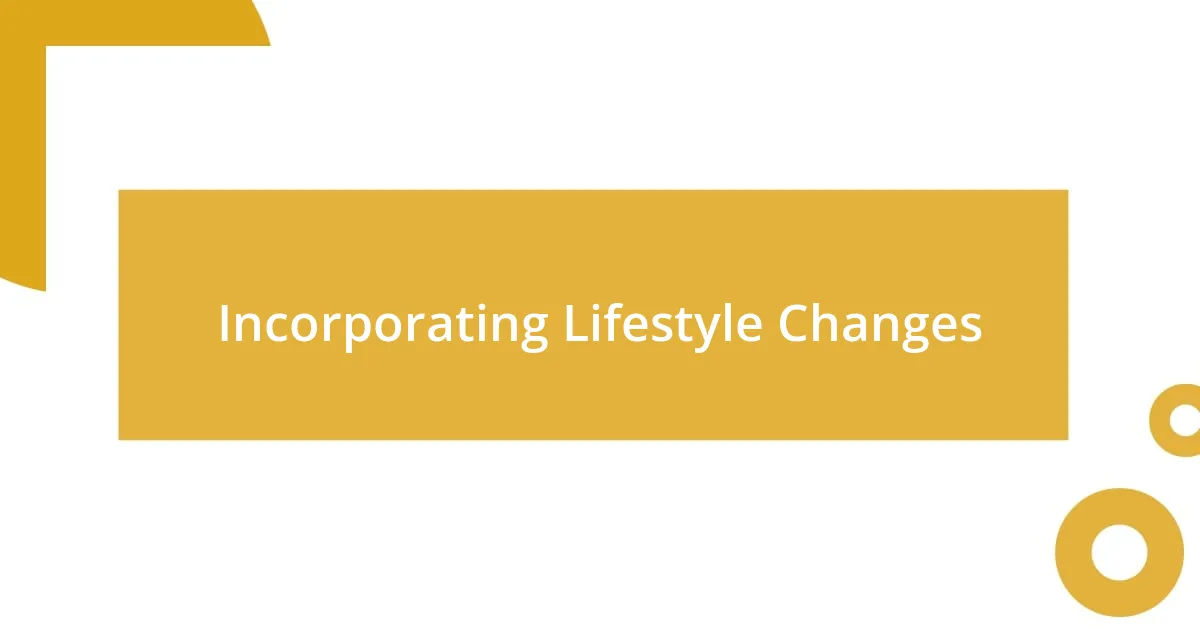
Incorporating Lifestyle Changes
Incorporating lifestyle changes became a transformative journey for me. I vividly remember the day I decided to swap out my usual takeout for more home-cooked meals. The first time I chopped fresh vegetables, I felt a sense of accomplishment wash over me, as if I was reclaiming my power over food choices. It wasn’t just about nourishment; it was about creating a ritual that connected me more deeply to my health journey. Have you ever felt the meditative state of focusing on an activity like cooking? That’s how I found joy in simple tasks, which invigorated my commitment to healthier eating.
Exercise also became an essential pillar of my new lifestyle. I recall choosing to start my mornings with brisk walks instead of the usual scroll through social media. Each step felt like a mini victory, reminding me of the significance of movement for both body and mind. I even began to notice the world around me—birds chirping, flowers blooming—how delightful it was to experience nature in that calm, focused state! Have you ever tried swapping your morning routine? It was a refreshing shift for me, a small change that imparted big benefits.
Additionally, prioritizing mental wellness emerged as a game-changer. I took up journaling, and expressing my thoughts on paper created an emotional release I didn’t realize I needed. Those moments of reflection allowed me to confront my fears and celebrate my progress. I sometimes ask myself, how often do we pause to truly listen to our feelings? By incorporating mindfulness practices like this, I found a way to embody a more balanced approach to my overall well-being. Each change, whether small or large, felt like another piece falling into place in my health puzzle.
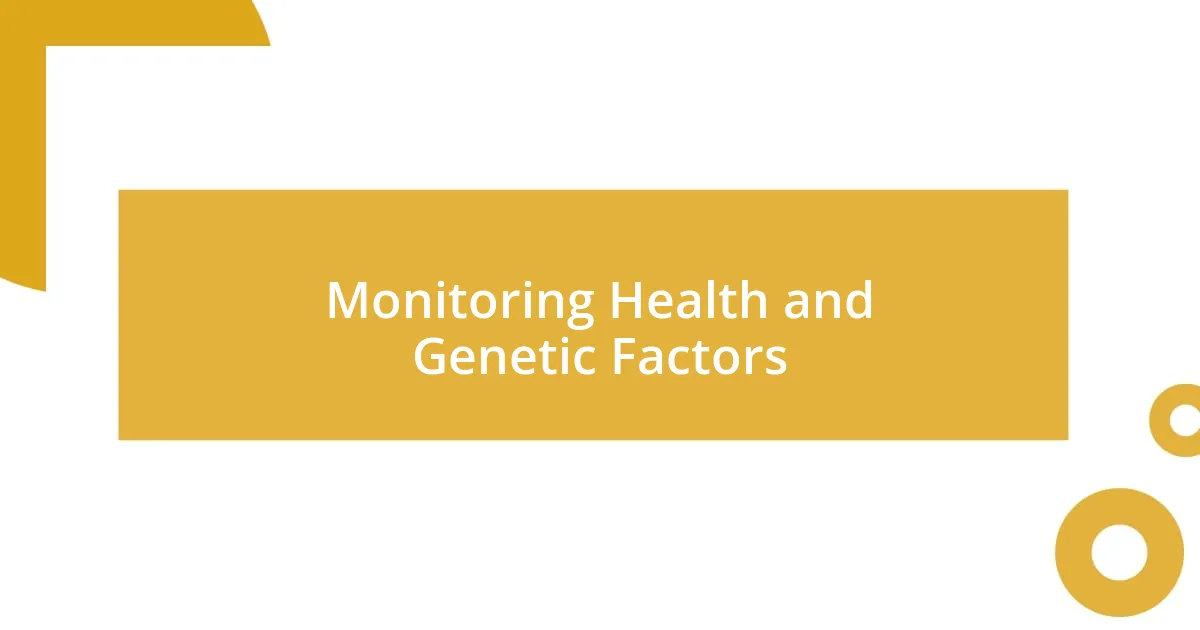
Monitoring Health and Genetic Factors
Monitoring my health and genetic factors has become an integral part of my life since that pivotal moment with the genetic counselor. I remember conducting regular health check-ins, much like maintaining a garden where I assess what’s blooming and what needs extra care. It’s empowering to acknowledge the interplay between genetics and my day-to-day health; for instance, tracking my blood pressure and cholesterol levels has shown me how my lifestyle choices directly impact my genetic predispositions.
I also embraced technology to keep a close watch on these factors. Using a health app felt like having a personal health companion at my fingertips. I could log my meals and workouts while receiving real-time insights about my body’s response. Have you ever tried using an app to track your health? For me, it created a tangible sense of accountability—I found joy in watching those numbers improve over time, reinforcing my commitment to my health journey.
Moreover, participating in genetic testing gave me a clearer picture of what to prioritize. Once, after receiving results that indicated a higher risk for a certain condition, I felt a wave of mixed emotions—concern and motivation intertwined. Rather than letting fear dictate my actions, I channeled it into proactive measures like screening and lifestyle adjustments. Isn’t it fascinating how knowledge can transform uncertainty into a sense of control? By consistently monitoring both my health and genetic factors, I’ve crafted a path that feels not just informed but deeply personal.
